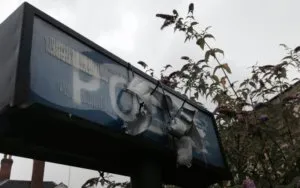Disabled campaigners say they are encouraged by a new public statement from the Crown Prosecution Service (CPS), which describes how it will prosecute disability hate crime.
The statement was one of a series published by CPS that cover the different strands of hate crime, with others covering racist and religious hate crime; and homophobic, biphobic and transphobic hate crime.
Its publication came only days after the Disability Hate Crime Network (DHCN) wrote to the solicitor general to warn him that that “alarm bells are ringing” over the “massive discrepancies and inconsistencies” in the way the criminal justice system deals with disability hate crime prosecutions.
That letter pointed to the network’s “deep dismay” that six recent court cases involving violent attacks on disabled people – reported last month by Disability News Service (DNS) – had not been treated as disability hate crimes.
In its new statement, CPS pledges to “identify disability hate crimes and other offences targeted at disabled people as early as possible”, “build strong cases with our partners”, “remind the court of its powers to increase a sentence” under section 146 of the Criminal Justice Act 2003 if there is evidence of disability hate crime*, and “apply for an increased sentence in all other cases where disability is an aggravating factor in the case”.
The statement also includes a commitment to the social model of disability, and a recognition that the belief that disabled people “are somehow inherently vulnerable, weak and easy targets is an attitude that motivates some crimes against disabled people”.
But it also states that some crimes are committed “because the offender perceives the disabled person to be vulnerable and not because the offender dislikes or hates the person or disabled people”, and are therefore not disability hate crimes.
CPS says that any such evidence will still be put before the court – even if the offence was not a hate crime – so that “the sentence reflects the gravity of such offending”.
It also promises that it will “not make assumptions about a disabled victim’s reliability or credibility, and [will] challenge others who do so”, will ensure that disabled people are aware of the support available to them to give their best evidence in court, and that it will be “more likely to prosecute cases where disability is a factor”.
And it adds: “We will avoid the use of the term ‘vulnerable’ where possible and we will always avoid any use of the term which may suggest disabled people are inherently weak or dependent.”
The statement also includes a pledge that CPS will treat online hate crime “with the same robust and proactive approach” used to address other hate crimes.
Alison Saunders, the director of public prosecutions, told the Guardian that an increasing proportion of hate crime was now carried out online, which she said provided “a less visible frontline which is easily accessible to those in the UK who hold extreme views on race, religion, sexuality, gender and even disability”.
CPS has also published a new online support guide for disabled victims and witnesses of crime.
Anne Novis (pictured, centre), chair of Inclusion London, who advised CPS on the new statement on disability hate crime, welcomed its publication.
She told DNS: “The CPS do seem to be doing all they can to improve prosecution of hate crimes, but are still limited by legislation inequalities and they can only prosecute based on the evidence police gather.”
Laws on publishing material intended to stir up hatred against people on the grounds of their race, religion or sexual orientation have so far not been extended to disability and transgender identity.
Novis said she had been “encouraged” by the CPS response to disability hate crime concerns raised by local communities, and through its engagement with mechanisms such as local case panels and community forums.
She said: “So overall it is positive as not only are they saying they will act, they are actively trying to do better.”
But she was critical of the police, and said that forces across the UK need to “step up their quality of evidence gathering and recognition of hate crimes”.
Stephen Brookes, a DHCN coordinator, welcomed the new CPS emphasis on online hate, but warned that “we need to see that disability hate crime does not become a poor second to race faith and gender online hate”.
Saunders said: “Hate crime has a corrosive effect on our society and that is why it is a priority area for the CPS.
“It can affect entire communities, forcing people to change their way of life and live in fear.
“These documents take account of the current breadth and context of offending to provide prosecutors with the best possible chance of achieving justice for victims. They also let victims and witnesses know what they should expect from us.
“I hope that, along with this week’s campaign, they will give people the confidence to come forward and report hate crime, in the knowledge that they will be taken seriously and given the support they need.”
*An offence will be a disability hate crime “if at the time of committing the offence, or immediately before or after doing so, the offender demonstrated towards the victim of the offence hostility based on a disability (or presumed disability) of the victim; or the offence is motivated (wholly or partly) by hostility towards persons who have a disability or a particular disability”.

 Met took formal action on just nine disability hate crimes in 2023, hustings is told
Met took formal action on just nine disability hate crimes in 2023, hustings is told ‘Shocking’ disability hate crime figures, a year on from police and CPS promises
‘Shocking’ disability hate crime figures, a year on from police and CPS promises Twitter silent over failure to act on epilepsy flashing images posts
Twitter silent over failure to act on epilepsy flashing images posts